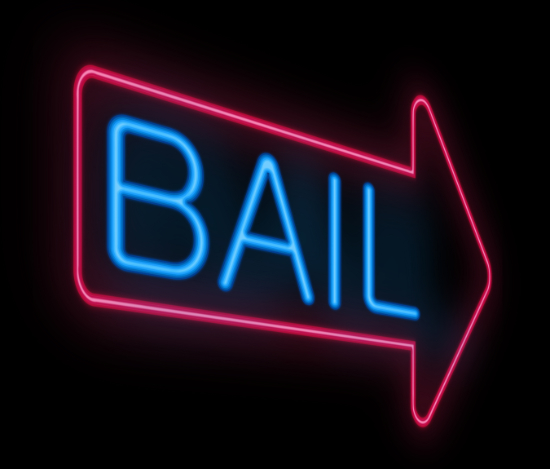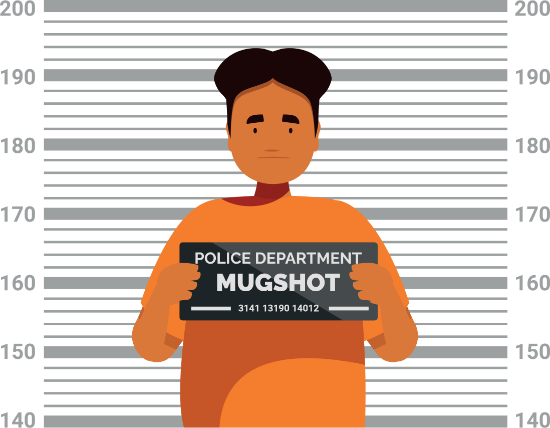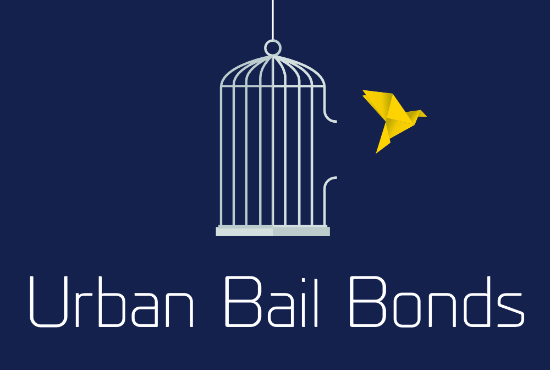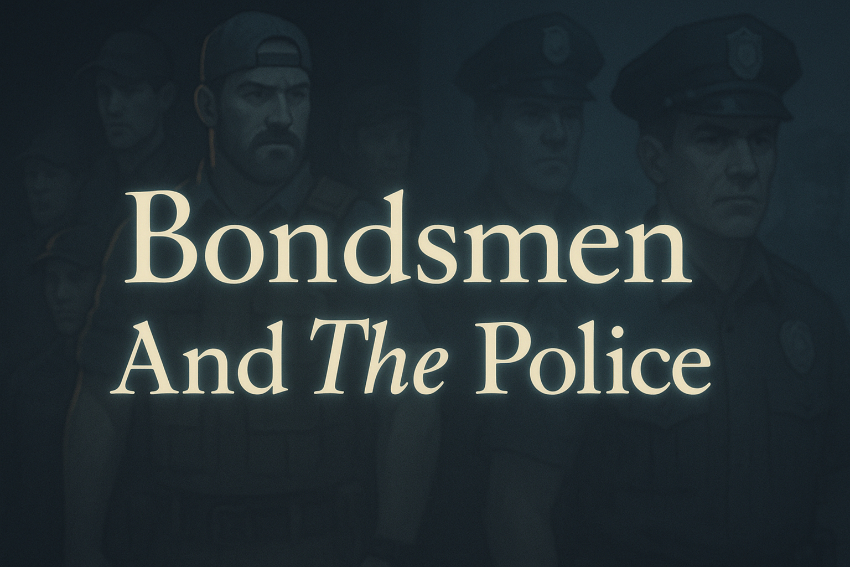A Close Look at the Relationship Between the Bondsman and the Police
For the most part, the relationship between bail bondsmen and the police in the US is one of mutual respect, appreciation and deference. Each understands the other has a crucial job to do and they do their best to stay out of each other’s way. That said, the overall relationship between the police and the bail bond agent can best be described as complex because, although they have unique functions when it comes to the administration of justice, their duties sometimes require them to interact and those interactions can occasionally become problematic.
The Roles of the Bondsman and the Police
The police are charged with maintaining public safety by preventing crime and apprehending suspected law-breakers. In the course of their duties, they make arrests, collect evidence and conduct investigations. They also work closely with prosecutors to help ensure that justice is done when the case gets to court.
Once the police arrest someone in Denver or elsewhere they begin their journey through the criminal justice system. One of the first aspects of that journey is that (in most cases) they are offered bail. The bail amount may come from a bail schedule or they may have to wait a day or two for a bail hearing during which the magistrate or judge will set bail.

“The principle of bail is not to be regarded as a punishment, but as a means of obtaining the release of a prisoner, and at the same time securing his appearance at the trial.” — U.S. Congress, Legislative History of the Bail Reform Act of 1966
Once bail is set the accused either pays the entire bail amount out of their own pocket or, more likely, they call a bail bond company that, in return for a modest fee, secures their release while they await their day in court.
If the accused makes all of their scheduled court appearances the bail amount is returned at the end of court proceedings. If, however, the accused flees after being released on bail the bondsman will be responsible for the entire bail amount. The bail agent may then hire a bounty hunter to track down and return the accused to jail, or they may try to recoup their losses from the cosigner of the bond, or both.
Points of Interaction Between the Police and the Bondsman
There are several times during the normal performance of their duties where police officers and bail bondsmen interact either directly or, more likely, indirectly. Those points are:
After a suspect has been booked
After arresting someone on suspicion of breaking the law that individual is processed at a police station. In most cases, once the person has been processed the police will present them with a bail amount taken from a bail schedule. The bail schedule denotes bail amounts for various infractions. (Should the case be more serious the accused may be held for a bail hearing.)
The police may also present the accused with a list of nearby bail companies. And if it is particularly late at night, bail companies that offer 24-hour bail bonds. Although the police do not work directly with the bondsmen they do set the stage for the bail agent to enter the process.

In cases where information sharing is necessary
In some cases, the bondsman will ask the police for details regarding a particular defendant. Those details commonly include the defendant’s arrest record, whether they have ever jumped bail before and exactly what they are being charged with. Remember, the bail bond agent is under no obligation to assist anyone. So if the person in question seems like more trouble than they’re worth, the bondsman may take a pass.
In cases of fugitive recovery
One of the areas where bondsmen and police typically see the most direct contact is during the process of fugitive recovery. If a defendant skips bail it’s in the interest of the bondsman to track them down and return them to jail. Not only will it help ensure the bondsman does not lose the money he’s invested in the defendant’s bond, returning the fugitive will also prevent damage to the bail company’s reputation.
But while the police understand the need for the bondsman to pursue fugitives this also happens to be one of the areas where the interests of the bondsman and the police may come into conflict. Not all the time. But it happens. And it typically happens because bounty hunters are not law enforcement officers, although they often present that appearance.
They are, in fact, private citizens who have accepted the job of tracking down the fugitive for a fee, and because their fee depends on their success some have been known to push the boundaries of acceptable action. The police then have to walk a tightrope between allowing the bounty hunter to do an admittedly difficult job and making sure no crimes have been committed in the performance of that job.

One of the easiest ways for a bondsman or bounty hunter to get on the wrong side of the police is to not inform them they will be operating in a particular area in pursuit of a fugitive. This is especially true when the bounty hunter is pursuing a fugitive across state lines. Most states require bounty hunters to inform local police that they will be active in a certain area and require specific information regarding the person being pursued and their alleged crime.
Should the bounty hunter misbehave in some way that invokes the ire of the police the bondsman’s reputation is at risk of taking a hit as well. Even if they knew nothing of the bounty hunter’s intentions.
Frequently Asked Questions About Police Officers and Bounty Hunters
No. Bounty hunters are private citizens hired by bail bond companies or sureties to locate and apprehend defendants who have skipped bail. Police officers are sworn public officials employed by government agencies, with broader authority and responsibilities for public safety, investigations, and enforcement of criminal laws.
Police officers have far broader legal authority than bounty hunters. Police can investigate crimes, make arrests based on probable cause, execute search warrants, and enforce a wide range of statutes. Bounty hunters are usually limited to apprehending specific defendants who failed to appear in court, under the terms of a bail contract, and must follow state-specific rules when doing so.
In many states, bounty hunters are required to notify local law enforcement before attempting to apprehend a fugitive, especially when crossing jurisdictional or state lines. Even in places where it is not strictly required, communicating with police is strongly recommended to avoid misunderstandings, safety risks, or interference with active investigations.
Police must generally obtain a warrant or meet a legal exception (such as exigent circumstances or consent) before entering a home. Bounty hunters may have different rights based on the defendant’s bail contract and state law, but they cannot ignore criminal trespass, assault, or weapons laws. Unlawful entries or use of force can result in criminal charges and civil lawsuits against the bounty hunter and, in some cases, the bonding company.
They sometimes coordinate, but they do not “partner” in the same way officers partner with other agencies. Police may share limited information or accept a fugitive into custody once a bounty hunter locates and apprehends them. However, bounty hunters operate on behalf of private bond companies, not the government, and police remain responsible for ensuring that any apprehension is carried out lawfully and safely.
A bounty hunter who assaults someone, damages property, or violates weapons or entry laws can face criminal charges and civil liability like any other private citizen. Depending on the circumstances and state law, the bail bond company that hired them may also face lawsuits or regulatory consequences, and their reputation with local law enforcement can suffer as well.
Final Thoughts
While the above is not an exhaustive study of the relationship between the bondsman and the police it should provide you with a clearer picture of this sometimes complex relationship. It’s a relationship shaped by shared interests in maintaining public order while making sure that neither the law nor the rights of the accused are trampled on in the process.
If You Need Affordable Bail Bonds in Broomfield or the surrounding counties Contact Urban Bail Co.**
Both the bail bond company and law enforcement share responsibility for maintaining public order. But theirs is not always an easy relationship. Still, both do their best to uphold the highest standards of their professions for the sake of the people they serve.
If you’re in Colorado and need a bail bondsman with a solid reputation who is available 24-hours a day you can search for “bail bonds near me”, or better yet, you can get in touch with the team at Urban Bail Co by calling 303-736-2275.


